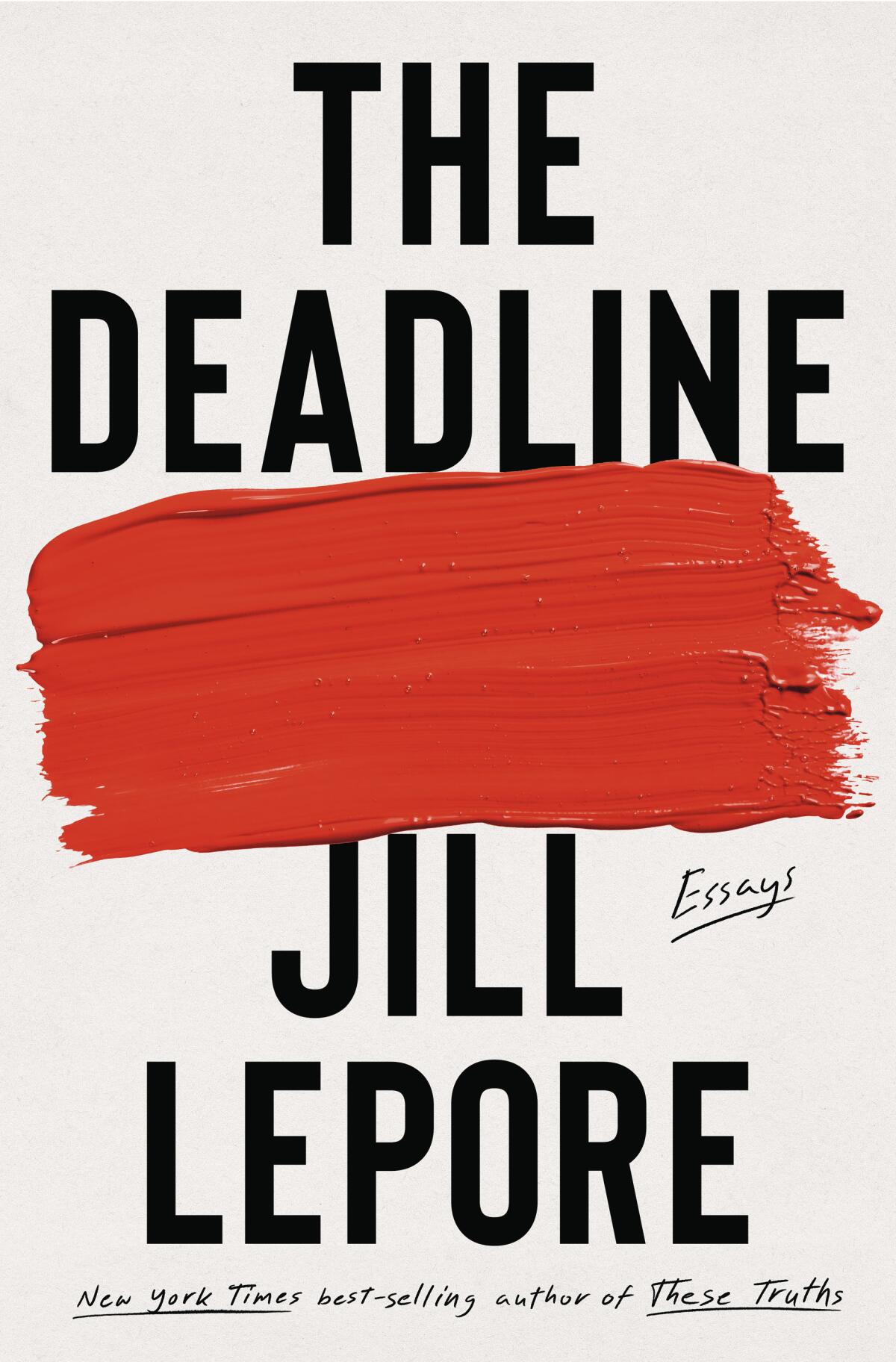From Barbie to MAGA, Jill Lepore’s essays bring the past into the harrowing present

Review
The Deadline: Essays
By Jill Lepore
Liveright: 640 pages, $45
If you buy books linked on our site, The Times may earn a commission from Bookshop.org, whose fees support independent bookstores.
Jill Lepore is unquestionably one of America’s best historians; it’s fair to say she’s one of its best writers too. Her books on subjects ranging from King Philip’s War and Jane Franklin to Wonder Woman and Joe Gould bear the fresh insight and scholarly rigor one would expect of a distinguished professor at Harvard, while her clarity and style often surpass the standard set by her other employer, the New Yorker. Her 2018 history of the United States, “These Truths,” will likely be read for many generations.
Lepore’s latest, “The Deadline,” collects essays from the last decade — 46 to be exact, totaling over 600 pages. It’s a hefty tome, and the publisher hopes to sell it as “a book to be read and kept for posterity,” which implies it needn’t be absorbed in one gulp. To each one’s own, I suppose, but I would recommend reading “The Deadline” front-to-back with as few breaks as possible. Taken in sequentially, Lepore’s essays constitute a dizzying, entertaining and urgent survey course on contemporary American life. Although Lepore dives deep into the waters of bygone eras, she always writes from the present — the palpable surface of history’s ever-rising tide.
Now nearly 73, Wonder Woman has become a relatively uncontroversial cultural icon in her old age, for sale on countless lunch boxes, T-shirts and collectible toys — even gracing the big screen in her very own motion picture slated for 2017.
“All historians are coroners,” she claims in the title essay, a beautiful meditation on the loss of her friend Jane. Indeed, many of the essays here are mournful if not outright eulogistic. “Prodigal Daughter” and “The Everyman Library” in the early, personal section poignantly celebrate her mother and father, respectively. Her clear-eyed portrait of Ruth Bader Ginsburg in relation to the “Notorious RBG” fandom that arose around her (“trivialization,” she notes, “is not tribute”) was written before Ginsburg’s death, but now serves as an excellent, honest panegyric for the late Supreme Court justice.
Lepore’s account of the litigious “doll wars” between Barbie and Bratz concludes with a rueful lament that “Empowerment feminism is a cynical sham.” It’s a particularly illuminating essay to read after the enormous success of Greta Gerwig’s adaptation, which playfully brings in many of Lepore’s ideas.
Much of her reportage on Donald Trump seems to mourn the death of nothing less than American democracy. Lepore ends a lengthy 2021 exploration of Gödel’s Loophole — the logician’s 1947 theory of how the U.S. Constitution could permit a transition to dictatorship — by glumly concluding, “What Gödel did not realize is that it’s actually a lot easier than that.”
Justice Ruth Bader Ginsburg, who championed women’s rights and was the second woman to serve on the Supreme Court, has died at 87.
Despite her historical scope, Lepore’s eye returns productively back to the present, particularly to remind us of how little our moment differs from what sounds like ancient history. In a powerful and sobering essay on Guantanamo, the history of torture and how the “laws of war can be debased and made, even, into weapons of war,” Lepore finds that the “precedent” claimed by Vice President Dick Cheney is legitimate. Trial by ordeal, trial by fire, blood sanctions, slavery — torture is an American tradition. And although President Obama ordered the closing of Guantanamo two days after his inauguration, she reminds us, he gave up on the directive in 2013, and the prison still holds 36 men inside.

Moreover, via drone strikes, Obama nevertheless executed his apparent “power to order not imprisonment without charge but the killing of men without anyone bringing evidence before any judicial body, not even an unconstitutional military commission.” It’s like some grotesque Yakov Smirnoff joke: Drone strikes bring Guantanamo to you. “This all happened not very long ago,” Lepore writes, “but it can seem like something from another age.”
We all know the cliché about studying the past to avoid repeating it — and the Trump era has only reinforced it. Lepore has ways of crystallizing that truth in both specific examples and fresh aphorisms. “Every dystopia is a history of the future,” she observes. The final six essays, which chronologically trace the ascendance of Trump and his MAGA-ites, leave the reader with a bleak picture of our political landscape, and the last essay, on the Jan. 6 committee report, left a chill. Trump’s election claim, Lepore writes, “is not a Big Lie devised by an orange-haired supervillain born rich in 1946: it is the latest chapter in a fictive counter-history of the United States that has been told by the far right for decades and decades and wretched decades.”
Annette Gordon-Reed, Ayad Akhtar, Héctor Tobar, Martha Minow, David Kaye and Jonathan Rauch discuss the Jan. 6 riot and what we do about it.
Judging by the number of references she makes, “The Simpsons” must be Lepore’s favorite show. So it seems appropriate to end with a particularly bleak “Simpsons” joke. Reading “The Deadline” can easily put you in the kind of mood that strikes Springfield news anchor Kent Brockman after he watches a politician sabotage a good bill by tacking on a rider supporting the “perverted arts.” “I’ve said it before, and I’ll say it again,” Brockman intones with gravitas: “Democracy simply doesn’t work.”
And yet. As long as we’ve got Lepore keeping an eye on it, there’s still hope.
Clark is the author of “An Oasis of Horror in a Desert of Boredom” and “Skateboard.”
More to Read
Sign up for our Book Club newsletter
Get the latest news, events and more from the Los Angeles Times Book Club, and help us get L.A. reading and talking.
You may occasionally receive promotional content from the Los Angeles Times.








